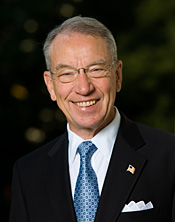
Q: What is Trade Promotion Authority (TPA)?
A: The Constitution vests authority in Congress to regulate commerce with foreign nations. And the President must take care that the laws are faithfully executed. As anyone who pays any attention to Washington knows, it’s not easy to get 535 lawmakers to agree even on what day of the week it is. Imagine trying to find consensus for a multilateral trade pact with, say, a dozen Pacific Rim nations or scores of countries from the EU. Recognizing the United States needs to speak with one voice of authority while negotiating agreements that open markets for U.S. goods, services and investment, the U.S. Congress has in the past approved a legislative tool called Trade Promotion Authority, or TPA. It’s used by Congress to better manage negotiations with potential trading partners. It works. When U.S. trade negotiators sit across the table with their counterparts from the European Union or Asia-Pacific economies, TPA gives our potential trade partners more confidence and the United States more credibility that a trade pact won’t be fiddled with once it’s presented to Congress for approval. Global trade agreements have stalled since TPA expired in 2007. Renewing TPA would help steer the U.S. economy back on the right track. It’d be good for America’s long-term prosperity.
Q: Are you concerned the TPA gives away too much authority to the President?
A: That’s a reasonable question considering the overreach this administration has pursued throughout the last five years. From the fatal gun-walking program at the Department of Justice to the political targeting at the IRS, the unlawful recess appointments the President has declared, the massive financial bail-outs and the unilateral changes to the Affordable Care Act decreed by the Department of Health and Human Services, the case can be made the Obama administration gets fuzzy on constitutional boundaries to pursue its agenda. That’s why the bipartisan TPA legislation I support requires strict transparency and reporting requirements, including consultations with Congress and beefed up congressional oversight during trade negotiations. Three primary mandates in the Trade Priorities Act of 2014 include directing the administration to pursue specific goals outlined by Congress; establishing transparency and access to information to Congress and the public before, during and after negotiations; and, giving Congress the final say to approve trade agreements via an up-or-down vote. These accountability provisions should apply regardless of which party holds the White House or the congressional majority. In addition, it’s always up to Congress in the end to decide whether or not to pass implementing legislation for any trade agreement negotiated.
Q: How is the proposed TPA good for America?
A: Renewing TPA is an important policy tool that would help create more opportunities for more Americans to get ahead. Policymakers need to focus on ways to expand the economic pie so that there’s more wealth to go around for everybody. And the global economic pie offers incredible opportunities for American businesses, investors, farmers and entrepreneurs to grow their business, hire more workers, increase wages, sell more products and achieve more prosperity. Today the United States is negotiating agreements with 11 Asia-Pacific nations (notably Japan and Vietnam), 28 members of the European Union, 22 additional countries for a trade in services agreement and the 159 members of the World Trade Organization. Just consider the Trans-Pacific and EU trade pacts would open markets for nearly 1 billion consumers, reaching nearly two-thirds of global GDP. Approving TPA would put the United States back in the driver’s seat on these trade pacts. The Asia-Pacific countries accounted for 40 percent of total U.S. goods exports in 2012. That same year, the EU purchased nearly $460 billion in U.S. goods and services. As Iowa’s senior U.S. Senator, I appreciate the feedback that I receive from Iowans on issues that matter most to them. Trade promotion authority is an issue that resonates strongly with grass roots groups that are opposed or in favor of renewing this measure. Phones ring off the hook whenever TPA is under consideration on Capitol Hill. This input strengthens congressional efforts to ensure trade promotion authority is used as intended with the proper checks and balances in place. That’s why TPA does not give the President unilateral authority to approve any negotiated trade pacts. And yet it does show our trading partners that America means business.
Q: What are the specific objectives mandated by Congress?
A: I don’t support giving the current or any President a blank slate to negotiate trade pacts. The bipartisan TPA legislation spells out specific rules that U.S. trade negotiators must follow to qualify for an up-or-down vote once the trade pact reaches Capitol Hill. These mandated objectives take into account the growing significance of the Internet and the trading of digital goods and services. The bill would establish protections for intellectual property; strengthen enforceable rules for agricultural trade disputes; eliminate barriers to cross-border investment; establish protections for cross-border data flows; enhance dispute resolution processes; and, update labor and environmental standards. TPA would help restore America’s commitment to economic freedom and free enterprise. Without it, our strategic interests in the international economy will wither and leave U.S. consumers, workers, job creators, farmers, ranchers, manufacturers, financial service providers, digital entrepreneurs and investors hanging in the wind. Other countries will reach agreements and increase job-generating export opportunities while we sit on the sidelines. From a series of Foreign Ambassador Tours I led throughout Iowa starting in 1986, I learned first-hand that economic diplomacy and old-fashioned hospitality foster immeasurable good will and plant seeds of opportunity. It’s time to renew TPA and cultivate opportunities with our trading partners. It’s time to let more U.S. workers find out that jobs in U.S. export industries pay on average 18 percent more. It’s time to embrace the rising tide of economic opportunity for all.






